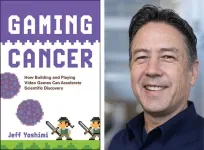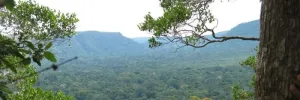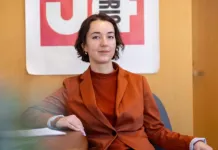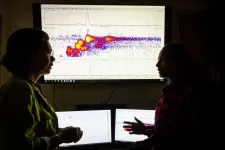(Press-News.org) Cancer is vicious. In 2025, it is expected to cause more than 618,000 U.S. deaths — nearly twice the combined populations of Merced and Modesto. Each year, almost half of this nation, young and old, is touched by the disease through personal diagnosis or an afflicted loved one.
Jeff Yoshimi joined the 50% when his wife, Sandy, learned she had breast cancer. The blighted cells had spread to some lymph nodes.
Alongside Sandy during one of many overnight hospital stays, Yoshimi drifted in and out of sleep, sifting through ideas drawn from his profession and passions: a Ph.D. in philosophy, research into how people perceive and experience the world and expertise with clarifying tough-to-grasp concepts by visualizing them in game-like ways.
How could he, a UC Merced cognitive science professor, take the fight to a horrible disease?
Suddenly, the pieces in his head snapped into place. Yoshimi grabbed his laptop, went across the street to an all-night coffee shop and began to type. Cancer, he knew, can be curable, but it takes so many forms and changes guises so often that it is incredibly tough to fend off. But what if the brainpower available to cancer research was increased exponentially? What if that power came from millions of minds that love to unravel mysteries, mash buttons and obliterate bad guys?
What if, Yoshimi thought, we scaled up the cancer battle with a suite of truly awesome video games? From that first flash in 2013 and over 11 years, he expanded the idea into a compelling action plan and put it in a book. “Gaming Cancer,” published by MIT Press. In it, he asserts that gamified citizen science, teamed with the soaring potential of artificial intelligence, can help power significant advances in cancer research.
Sandy Yoshimi is alive and well today after enduring a grueling journey of surgery, chemo, radiation and pills. Cancer, however, was not done with the family. Sandy Yoshimi’s sister died from colon cancer not long after Jeff Yoshimi started writing the book. In 2023, bile duct cancer took the life of Sandy’s father.
“Much of this book was written in cancer wards and chemo rooms,” Yoshimi says in the first chapter.
The book’s subtitle describes the goal: “How Building and Playing Video Games Can Accelerate Scientific Discovery.” With a breezy writing style, Yoshimi walks readers through not just how it can be done but why it should be done.
“Scientific problems associated with cancer are messy and complex,” he wrote, “but in some cases they have core logic that can be presented in a game context with its simplified rules.”
Citizen science games are out there, though on a far smaller scale than what Yoshimi lays out in the book. One example: “Foldit” makes a video game out of how proteins restructure themselves. Outcomes from this “protein folding” game can help scientists understand cellular mutation and runaway replication of diseased tissue. It can help perfect therapeutic drugs.
In 2020, about 750,000 users played “Foldit.” An impressive number, but Yoshimi is thinking bigger. Like “Baldur’s Gate” bigger. “Candy Crush” bigger.
Yoshimi has hands-on experience with game-style programs. In 2008 he created Simbrain, where users design neural networks with simplified visuals. He uses Simbrain in his courses and research, helping students and colleagues grasp aspects of neuroscience, psychology and artificial intelligence.
In an interview, Yoshimi, a UC Merced founding faculty member who came aboard in 2004, talked about the knowledge that could be unleashed by scaling up citizen science. He told a story about going to a restaurant with his father and seeing a boy whose knee bounced like a jackhammer.
“My dad said, ‘I wonder if we could make a little generator, attach it to that knee and capture all that energy,’” Yoshimi said.
“That stuck with me. People have these exquisitely evolved brains and we enjoy solving puzzles. It’s good for the species. So we have this huge reservoir of untapped problem-solving power, this Earth-wide computing effort being used on ‘Grand Theft Auto.’
“What if we redirected some of that to problems of broad significance, like cancer?”
In the book, Yoshimi discusses the “meta-game” — the process of creating this suite of powerful, irresistible games. He details everything they need: crack programmers, visionary leaders and deep-pocketed financiers, as well as reward structures for users and smooth links between gamers and labs. At the center of it all Yoshimi envisions Simbody, a game engine that simulates biological systems from whole bodies to nanoscale.
Start with a cancer conundrum. Break down the problem until there’s one task a game could tackle. Plug it in. Yoshimi said the suite, which he dubbed “Cancer Wars,” could use all the game styles: action, adventure, role-playing, first-person shooter, strategy, sports.
Only a couple years ago, artificial intelligence, which Yoshimi has studied for years, punched the turbos with the arrival of large language models such as ChatGPT. Suddenly, it seemed AI was going to change the game. Why turn to people for crowdsourcing when LLMs have trillions of bits of information crowded into their silicon brains?
Actually, why not do both?
Yoshimi said many of the existing citizen science games have AI elements that work hand-in-hand with the player, matching the former’s data-processing power with the latter’s power of intuition.
“We want to have human-AI symbiosis,” he said. “AI can do raw number crunching and statistical generalization. Humans see the bigger picture, the relevance of one thing to another, the creative insight that a machine finds harder to capture.”
Think Capt. Picard and Data, Yoshimi said. Luke Skywalker and C3PO. Kirk and Spock.
“AI has made big jumps, but it’s not at a point where we push a button, ChatGPT thinks about it for a month and solves the problem,” he said. “The best games will take AI as far as it can go, interweaved with human intelligence, so the experience is seamless.”
Yoshimi hopes “Gaming Cancer” offers a roadmap for ramping up video games in the fight against cancer. He added that eradicating the disease is a worthy goal but certainly not the only one. There are countless important victories within reach. Detection and treatments for the hundreds of cancer types demand attention. Games can foster an understanding of clinical research and promote lifestyle choices that can reduce cancer risk.
Because this is cancer we’re talking about. Only heart disease kills more Americans. Why not bring a legion of video gamers into the battle?
“It’s worth the effort,” Yoshimi said. “Even if you don’t hit the moon shot, all the intermediate shots are valuable.”
END
How creating and playing terrific video games can accelerate the battle against cancer
"Gaming Cancer" provides a roadmap for linking legions of players to AI and researchers to solve the many mysteries of multifaceted, deadly disease.
2025-01-23
ELSE PRESS RELEASES FROM THIS DATE:
Rooting for resistance: How soybeans tackle nematode invaders is no secret anymore
2025-01-23
“Fight-or-flight” is not an option for plants, unfortunately, when it comes to pathogen attacks. Instead, plants opt for “do-or-die.” A deeper insight into the genetic mechanisms that enable plants to resist pathogen infections has equipped researchers with tools to tackle the most devastating pathogens in agriculture. Using advanced RNA sequencing, researchers have recently uncovered how varieties of soybean respond to different types of soybean cyst nematodes (SCNs), with potential implications for developing more resilient crops and reducing reliance on chemical treatments.
Published ...
Beer helps grocery stores tap sales in other categories
2025-01-23
ITHACA, N.Y. – When a grocery store starts selling beer, its sales grow beyond just six-packs and cases: Households, and beer-purchasing households in particular, visit the store more frequently and increase their total monthly grocery expenditures, according to new Cornell research.
The finding has important implications for the intensely competitive grocery business, which operates on razor-thin profit margins between 1 and 3%, well below other retail sectors. One approach to boosting profits is employing “loss leaders,” specific products sold below cost to attract customers to a store and encourage them to buy other, more profitable ...
New USF study: Surprisingly, pulmonary fibrosis patients with COVID-19 improve
2025-01-23
Key takeaways:
Pulmonary fibrosis in patients with COVID-19 tends to resolve, while idiopathic pulmonary fibrosis always progresses
Scientists believe key immune elements – cells and genes – may explain resolution versus progression of the disease
“Both diseases are caused by injury to alveolar epithelial cells in the lungs. In the case of COVID-19, the injury is viral and acute and in the case of IPF, the injury is unknown but repetitive and chronic — so that may explain the different patterns of pulmonary fibrosis progression.’’
TAMPA, Fla. (Jan. 23, 2025) ...
In a landmark study, an NYBG scientist and colleagues find that reforestation stands out among plant-based climate-mitigation strategies as most beneficial for wildlife biodiversity
2025-01-23
Bronx, NY—In the global effort to combat climate change, large-scale, plant-based strategies such as planting forests and cultivating biofuels are an increasingly important part of countries’ plans to reduce their overall carbon emissions, but a landmark new study in the journal Science finds that well-intended strategies could have unforeseen impacts on biodiversity and that, in general, restoring forests has the most beneficial effect on wildlife.
The authors, including New York Botanical Garden (NYBG) Assistant Curator Evelyn Beaury, Ph.D., argue that policy makers and conservation officials should consider impacts on biodiversity when evaluating the ...
RSClin® Tool N+ gives more accurate estimates of recurrence risk and individual chemotherapy benefit in node-positive breast cancer
2025-01-23
A new statistical tool that combines multiple clinical and pathologic factors with a patient's 21-gene Oncotype DX Breast Recurrence Score® result provides more accurate estimates about that patient’s breast cancer prognosis and their potential benefit from chemotherapy than either the Recurrence Score® result or clinical factors alone.
The tool could be used in counseling patients with hormone receptor-positive (HR+), HER2-negative breast cancer that has spread to the lymph nodes, and could improve shared decision-making ...
Terahertz pulses induce chirality in a non-chiral crystal
2025-01-23
Chirality refers to objects that cannot be superimposed to their mirror images through any combination of rotations or translations, much like the distinct left and right hands of a human. In chiral crystals, the spatial arrangement of atoms confers a specific "handedness", which, for example, influences their optical and electrical properties.
The Hamburg-Oxford team focused on so-called antiferro-chirals, a type of non-chiral crystals reminiscent of antiferro-magnetic materials, in which magnetic ...
AI judged to be more compassionate than expert crisis responders: Study
2025-01-23
By definition, robots can’t feel empathy — it requires being able to relate to another person’s human experience, to put yourself in their shoes.
But according to new U of T Scarborough research, artificial intelligence (AI) can create empathetic responses more reliably and consistently than humans, even when compared to professionals whose job relies on empathizing with those in need.
“AI doesn’t get tired,” says Dariya Ovsyannikova (HBSc 2023 UTSC), lab manager in Professor Michael Inzlicht’s lab at U of T Scarborough ...
Scale-up fabrication of perovskite quantum dots
2025-01-23
Quantum dots are tiny semiconductor nano materials with color-tunable and high-efficiency photoluminescence, which have been successfully applied in different display technology such as liquid crystal displays (LCDs), organic light-emitting diodes (OLEDs), and micro light-emitting diodes (Micro-LEDs). In 2023, the Nobel Prize in Chemistry rewards the discovery and development of quantum dots. Perovskite quantum dots (PQDs) are emerging display materials with high absorption coefficient, low cost and easy processability, and less environmental impact. ...
Adverse childhood experiences influence potentially dangerous firearm-related behavior in adulthood
2025-01-23
Researchers at Rutgers University have found that adverse childhood experiences can make people more sensitive to potential threats from others, which in turn increases their risk of engaging in defensive gun use in adulthood.
Their study, published in the Journal of Psychiatric Research, used cross-sectional data from a subsample of 3,130 adults with firearm access drawn from a nationally representative sample of U.S. adults.
Those surveyed were asked about their childhood experiences with abuse and neglect, their levels of social distrust and sensitivity to perceived threats, depressive symptoms and their self-reported use of a gun for self-defense.
The authors first assessed the association ...
Bacteria found to eat forever chemicals — and even some of their toxic byproducts
2025-01-23
BUFFALO, N.Y. — In the quest to take the “forever” out of “forever chemicals,” bacteria might be our ally.
Most remediation of per- and polyfluoroalkyl substances (PFAS) involves adsorbing and trapping them, but certain microbes can actually break apart the strong chemical bonds that allow these chemicals to persist for so long in the environment.
Now, a University at Buffalo-led team has identified a strain of bacteria that can break down and transform at least three types of PFAS, and, perhaps even more crucially, some of ...
LAST 30 PRESS RELEASES:
GLP-1 drugs associated with reduced need for emergency care for migraine
New knowledge on heritability paves the way for better treatment of people with chronic inflammatory bowel disease
Under the Lens: Microbiologists Nicola Holden and Gil Domingue weigh in on the raw milk debate
Science reveals why you can’t resist a snack – even when you’re full
Kidney cancer study finds belzutifan plus pembrolizumab post-surgery helps patients at high risk for relapse stay cancer-free longer
Alkali cation effects in electrochemical carbon dioxide reduction
Test platforms for charging wireless cars now fit on a bench
$3 million NIH grant funds national study of Medicare Advantage’s benefit expansion into social supports
Amplified Sciences achieves CAP accreditation for cutting-edge diagnostic lab
Fred Hutch announces 12 recipients of the annual Harold M. Weintraub Graduate Student Award
Native forest litter helps rebuild soil life in post-mining landscapes
Mountain soils in arid regions may emit more greenhouse gas as climate shifts, new study finds
Pairing biochar with other soil amendments could unlock stronger gains in soil health
Why do we get a skip in our step when we’re happy? Thank dopamine
UC Irvine scientists uncover cellular mechanism behind muscle repair
Platform to map living brain noninvasively takes next big step
Stress-testing the Cascadia Subduction Zone reveals variability that could impact how earthquakes spread
We may be underestimating the true carbon cost of northern wildfires
Blood test predicts which bladder cancer patients may safely skip surgery
Kennesaw State's Vijay Anand honored as National Academy of Inventors Senior Member
Recovery from whaling reveals the role of age in Humpback reproduction
Can the canny tick help prevent disease like MS and cancer?
Newcomer children show lower rates of emergency department use for non‑urgent conditions, study finds
Cognitive and neuropsychiatric function in former American football players
From trash to climate tech: rubber gloves find new life as carbon capturers materials
A step towards needed treatments for hantaviruses in new molecular map
Boys are more motivated, while girls are more compassionate?
Study identifies opposing roles for IL6 and IL6R in long-term mortality
AI accurately spots medical disorder from privacy-conscious hand images
Transient Pauli blocking for broadband ultrafast optical switching
[Press-News.org] How creating and playing terrific video games can accelerate the battle against cancer"Gaming Cancer" provides a roadmap for linking legions of players to AI and researchers to solve the many mysteries of multifaceted, deadly disease.








